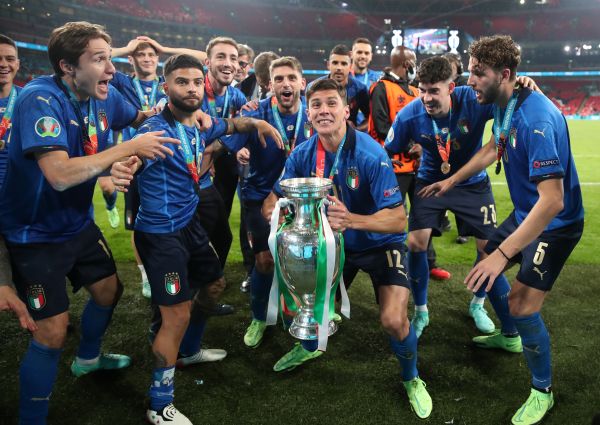Italy is once again reeling after failing to reach a second straight World Cup, throwing away automatic qualification before falling to a devastating defeat in the playoffs by North Macedonia.
Here we look at what has happened to the Azzurri since their triumph at Euro 2020, which seemed to announce their return as a world power after missing out in 2018.
Swaggering style vanishes
One of the hallmarks of the early stages of Roberto Mancini’s reign as coach was that he gave the players freedom to enjoy their football and insisted on an expansive style of play, which engaged supporters and created real momentum heading into the Euros.
After bringing in new faces throughout the team Italy won every match in Euro qualification and their first three World Cup qualifiers, often with a more relaxed style than traditionally associated with the discipline-focused Italians.
However, once Leonardo Spinazzola injured his achilles tendon in their 2-1 quarter-final win over Belgium, Italy lost a key outlet and regressed to a more traditional, solid style which bled into their performances post-Wembley.
On Thursday, Italy dominated as expected but there was a huge feeling of tension on the pitch which had increased with each underwhelming performance.
Goals drying up
The win over Belgium in Munich in the Euro quarter-final was their 13th in a row stretching back to the previous November, during which time they had scored 36 times and conceded just twice.
Between then and Thursday’s disaster they drew six times in nine matches with five of their 13 goals coming in one of their two wins, against Lithuania.
Up front is where Italy are weakest, but Ciro Immobile’s inability to replicate his superb Lazio form for the national team is the most striking example of how stale Italy’s football has become.
Chances have been hard to come by in recent matches and their final two regular qualifiers, against Switzerland and Northern Ireland in November, were particularly lacking in the invention which would give someone like former European Golden Shoe winner Immobile the opportunities he needs to score.
And again, on Thursday, he was almost invisible, his back permanently to goal and crowded out both by a packed defence and two wingers cutting inside to shoot rather than create width.
Good old-fashioned luck
Mancini said that “the good luck we had in our favour changed into total bad luck”, and while good fortune doesn’t explain why he persisted with off-form players like Lorenzo Insigne and Nicolo Barella, it is a factor.
Had Jorginho scored his stoppage time penalty in Italy’s penultimate qualifier against Switzerland Italy would almost certainly already have their ticket to Qatar.
However, the Chelsea midfielder smashed his spot kick on to the Stadio Olimpico running track, the match finished one apiece and that allowed the Swiss to steal first place in Group C on the final day.
The story would also probably have been different had Yann Sommer, the hero of a famous Euro shootout win over France, not saved another Jorginho penalty in September’s goalless draw in Basel.
Penalties may not be a complete lottery but to win two shootouts after being the worse side in the Euro semi-final and final requires some good fortune which has simply run out since.





